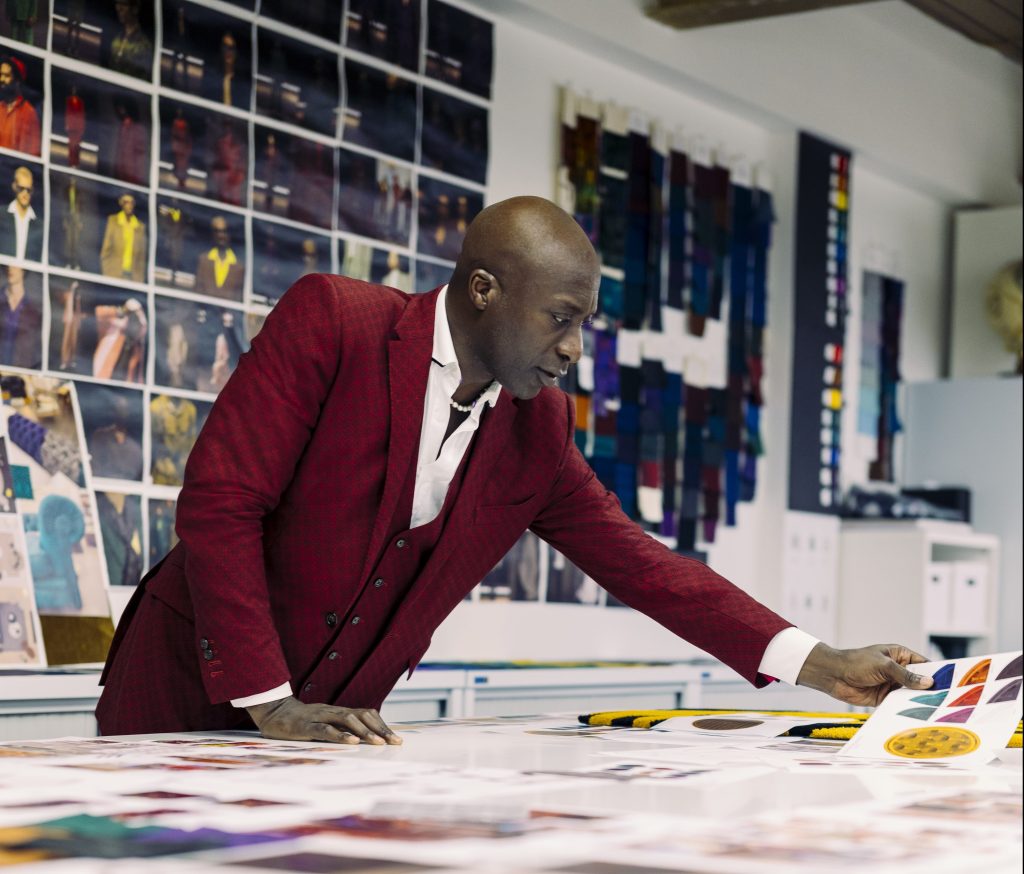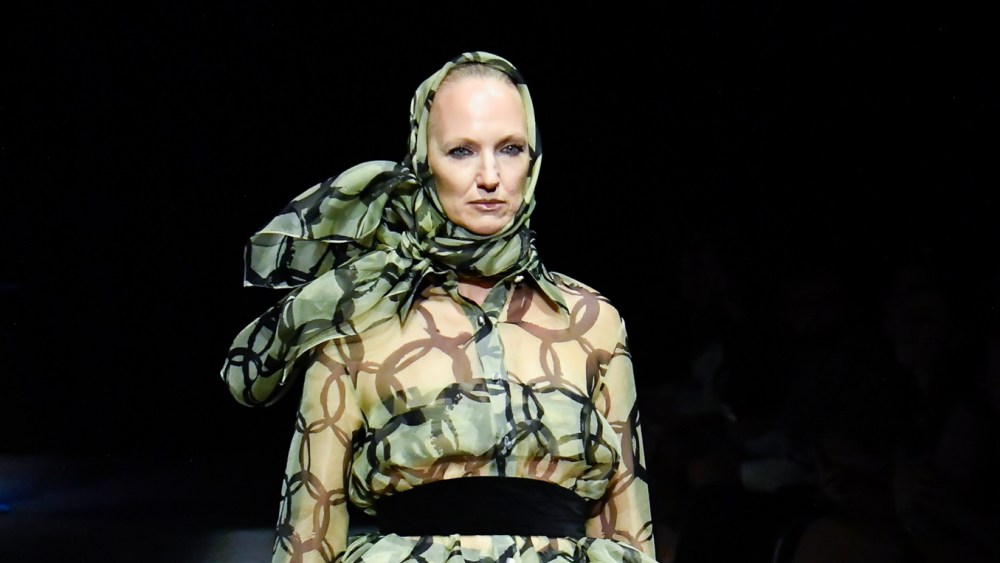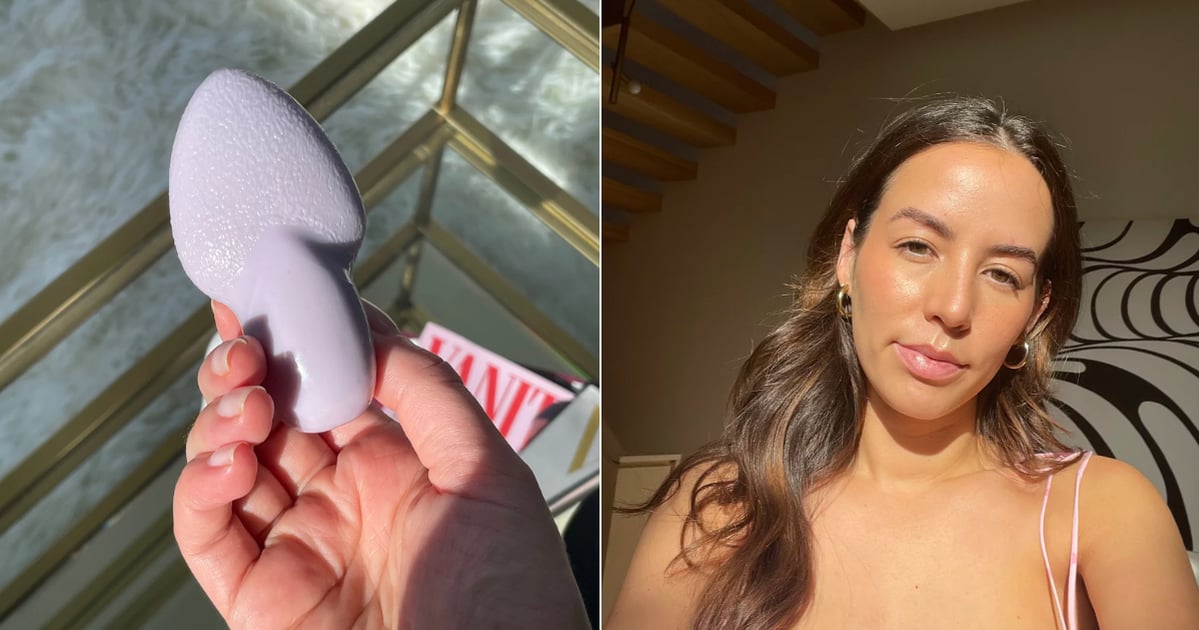MILAN — Ozwald Boateng, the veteran Savile Row tailor known for his colorful bespoke patterns and intricate designs, is about to inject his flair into the design world. During the London Design Festival, which kicks off Saturday, Poltrona Frau will present a new collaboration with the British menswear designer, marking his first-ever collection of interiors and furnishings.
The new capsule collection consists of furniture, accessories, textiles and wallpaper, combining Poltrona Frau’s artisanship with Boateng’s culture and African aesthetics and British tailoring expertise.
One can’t help but recognize that this is a landmark not only for Boateng, who has helped pave the way for African diaspora creatives in the U.K. and beyond for decades, but also for the high-end design world, which lacks diversity in top positions.
“There’s much hope for greater openness… There’s an explosion of Black creativity right across the board from film to photography to art and to music. [In the past] if you were born in Africa, you never had a cultural voice that resonated globally,” the designer told WWD in an interview. Testament to Britain’s cultural progress, Boateng celebrated a design landmark earlier this year, with the debut of the first new uniforms for British Airways in-flight and ground workers in nearly 20 years. The last designer to dress the staff was Julien Macdonald.

Born to Ghanaian parents in London, Boateng began his career on Savile Row in the late 1980s and was credited with rejuvenating the profession of tailoring when he opened his first shop in 1995 at the age of 28. From 2003-2006 he was creative director for menswear at Givenchy and was awarded an Order of the British Empire by Queen Elizabeth II in 2005. A firm believer in the value of the African diaspora and and the African continent’s potential, Boateng was also key in the formation of the Made in Africa organization, dedicated to bringing innovative ideas to Africa while advising governments on infrastructure, innovation and development finance.
“Creativity is about creating beautiful pieces, that move your spirit, right? When you do that, that cuts through all levels of bias, you know? And so that’s basically what this collaboration is demonstrating,” he continued.

Italian firms — especially in the fashion world — have been under fire for a lack of diversity that misrepresents the nation’s actual cultural fabric. Specifically Italian firms do not typically divulge employee data that could potentially hold them accountable for not hiring enough citizens of Italian-born residents who hail from diverse backgrounds.
For Poltrona Frau, the collaboration with Boateng is as much about being open-minded as it is about incorporating his decades of expertise into the fold.
“As Poltrona Frau continues to expand its horizons, first in the world of art and now fashion, we welcome the mastery, talent and unique perspective of Boateng, who has beautifully melded his expertise in English tailoring and exploration of African patterns with our own tradition of Made in Italy design,” remarked Poltrona Frau chief executive officer Nicola Coropulis.
This summer, the U.S. based design-forward brand CB2 made a statement that resonated when they boldly decided to embrace African creativity, launching a collection of works designed exclusively by Black artists and designers around the globe — from the streets of Paris and Lagos to the shores of the Caribbean. Elsewhere, Virgil Abloh, before his death, partnered with luxury furniture brand Cassina and home decor company Alessi.

The U.K. native pointed out that designing furniture isn’t so much of a departure from designing suits, given his expertise in fabrics, though stepping into Poltrona Frau’s headquarters and meeting their artisans was an awe-inspiring experience, recalling the first time he encountered their machine which determines how many times a couch or chair can be sat on. “It blew my fuses… a mad amount!”
The centerpiece of the collection is a contemporary reimagining of Poltrona Frau’s iconic Chester sofa, which was originally designed in 1912, with rolled, pleated armrests and quilted finish and inspired by the Edwardian Chesterfield sofas Poltrona Frau founder discovered on voyages to England. Today, it is reintroduced with Boateng’s signature flair, embossed leather inspired by traditional kente cloths, brightly woven fabric typically worn on formal occasions.
Similarly the Vanity Fair armchair was fashioned in velvet fabric and printed with his Tribal pattern in several bold hues like red, yellow, purple, blue, green and black. In addition, vases, candles, tabletop accessories and even a Mancala game, typically played in Africa for millennia, enrich the collection with a sense of authenticity. It was also a tribute to his Ashanti roots, as his parents are from the city of Kumasi, a city in the Ashanti region. Fabrics like the kente, he explains, are so much more than fabrics, they have a “spiritual dimension” and a “fabric worn by kings” for centuries.
For a designer who has dressed A-list megastars like Mick Jagger and Spike Lee and emboldened a generation with his unique African approach to tailoring — why furniture and why now?
“It’s interesting because over the decades of me designing, it’s always been about this relationship with me and interiors and furniture because of my use of fabrics, my design [expertise] of textiles, which is something I’ve really built my name on. And because I’m a stickler for quality, it was always about finding the right partner execution.”




